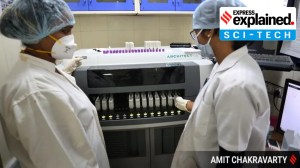- India
- International
After US FDA, CDSCO issues device alert on 3 Medtronic pacemakers
The Central Drugs Standard Control Organisation (CDSCO) alert on Saturday comes over a week after the US Food and Drug Administration (US FDA) flagged five such models of Medtronic’s pacemakers and cardiac resynchronisation therapy pacemakers (CRT-P) for issues related to their batteries.
 A pacemaker or CRT-P is an essential device used by patients if their heartbeat is too slow or in the treatment of heart failure to help their heart beat normally.
A pacemaker or CRT-P is an essential device used by patients if their heartbeat is too slow or in the treatment of heart failure to help their heart beat normally.
India’s apex drug regulator has issued an alert to healthcare providers, heart patients and medical device distributors on measures they have to take to prevent safety issues with three models of Medtronic’s pacemakers. The Central Drugs Standard Control Organisation (CDSCO) alert on Saturday comes over a week after the US Food and Drug Administration (US FDA) flagged five such models of Medtronic’s pacemakers and cardiac resynchronisation therapy pacemakers (CRT-P) for issues related to their batteries. In one such case, the issue led to the death of a patient, according to the regulator.
However, no adverse events have been reported in India so far, according to the Indian arm of the US medical device giant. A pacemaker or CRT-P is an essential device used by patients if their heartbeat is too slow or in the treatment of heart failure to help their heart beat normally.
CDSCO’s alert mentions three of the five models flagged by US FDA that are used in India — Astra, Serena CRT-P and Solara CRT-P.
“We are asking them (Medtronic) to communicate this alert to all patients who got implanted with this device,” a senior health ministry official told The Indian Express on condition of anonymity. As on date, around 1,550 of these three models have been sold in India, the official added. Like US FDA’s alert, CDSCO has told healthcare providers to help patients determine whether replacement of the device is “appropriate” for their needs and to consider whether elective device replacement is warranted for any of their pacemaker-dependent patients.
It has also reiterated US FDA’s recommendation that healthcare providers “be aware” of sudden battery level drops during follow-up visits and remote transmissions. It has further asked patients to seek “immediate medical care” in the event they feel lightheaded or dizzy or if they experience chest pain or severe shortness of breath.

“Medtronic India has not yet received any communication about an alert from Central Drugs Standard Control Organisation,” a spokesperson for the company told The Indian Express.
“We are in proactive discussion with CDSCO on this matter,” the spokesperson added.
According to a performance note on the five pacemakers and CRT-Ps, only three complaints were received out of over 2.60 lakh devices distributed worldwide since February 2017, the spokesperson stated.
“The projected rate of occurrence for this issue is 0.0028 per cent, with the most susceptible period being the first 12 months after a device is implanted…There have been no patient issues reported in India related to this performance note,” the person said.
“In consultation with our Independent Physician Quality Panel, we do not recommend device replacement, and advise physicians to continue normal patient follow-up in accordance with standard practice and, where possible, to continue with remote monitoring. While the devices continue to perform well within reliability projections, Medtronic has implemented additional process and component enhancements that have been reviewed and approved by FDA,” Medtronic’s spokesperson added.
On May 7, the US FDA released an alert stating that it was aware of three medical device reports in which a Medtronic implantable pacemaker or CRT-P battery had “fully drained” because of a crack in the device’s capacitor, without “any warning” to the patient or healthcare provider. A crack in the capacitor can create an electric short that drains the battery, which makes it ineffective for patients using them and dangerous for patients who heavily rely on pacemakers.
Medtronic had been unable to communicate with the devices due to the battery depletion, These incidents had occurred a year after the patients had received the pacemakers, despite the battery life of the pacemakers expected to be 7.5-15 years and the CRT-P, 6-10 years, according to the US FDA notification.
“One of the reported events resulted in the death of a pacemaker-dependent patient,” stated the US FDA.
May 07: Latest News
- 01
- 02
- 03
- 04
- 05





































